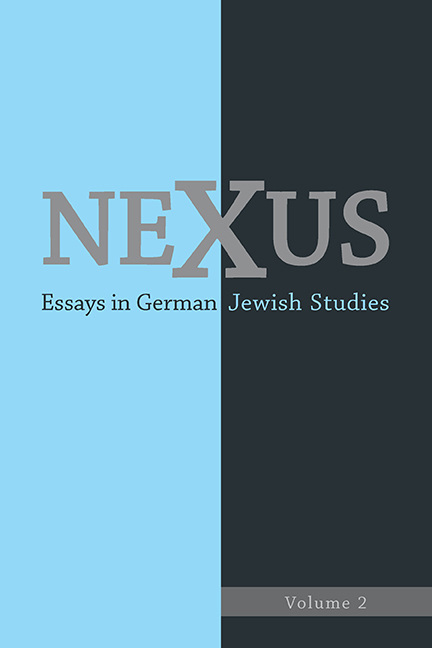Book contents
- Frontmatter
- Dedication
- Contents
- Acknowledgments
- Introduction
- Nexus Forum
- Introduction to the Nexus Forum A Most Unwanted Man: Hans-Joachim Schoeps
- Jew, Prussian, German: The Adventuresome Story of Hans-Joachim Schoeps
- Hans-Joachim Schoeps: Contrarian Scholar
- The Meyerowitz Family from Königsberg: Contemporaries of Hans-Joachim Schoeps
- From the Margins: A Response to Schoeps on Schoeps
- A Conservative Christian Welcome: A Response to Julius Schoeps
- Facing His Nazi Past? A Response to Schoeps on Schoeps
- Setting the Record Straight Regarding The Protocols of the Elders of Zion: A Fool's Errand?
- A Discussion of the “German” Dimension of Reform Judaism in Select Congregations in Three American Southern States, 1860–1880
- Weimar on Broadway: Fritz Kortner and Dorothy Thompson's Refugee Play Another Sun
- If I forget thee, O Jerusalem: The Jewish Exilic Mind in Else Lasker-Schüler's IchundIch
- “Seit ein Gespräch wir sind und hören können von einander”: Martin Buber's Message to Postwar Germany
- Hungerkünstler: George Tabori Directs Kafka in Bremen (1977)
“Seit ein Gespräch wir sind und hören können von einander”: Martin Buber's Message to Postwar Germany
from Nexus Forum
Published online by Cambridge University Press: 15 March 2018
- Frontmatter
- Dedication
- Contents
- Acknowledgments
- Introduction
- Nexus Forum
- Introduction to the Nexus Forum A Most Unwanted Man: Hans-Joachim Schoeps
- Jew, Prussian, German: The Adventuresome Story of Hans-Joachim Schoeps
- Hans-Joachim Schoeps: Contrarian Scholar
- The Meyerowitz Family from Königsberg: Contemporaries of Hans-Joachim Schoeps
- From the Margins: A Response to Schoeps on Schoeps
- A Conservative Christian Welcome: A Response to Julius Schoeps
- Facing His Nazi Past? A Response to Schoeps on Schoeps
- Setting the Record Straight Regarding The Protocols of the Elders of Zion: A Fool's Errand?
- A Discussion of the “German” Dimension of Reform Judaism in Select Congregations in Three American Southern States, 1860–1880
- Weimar on Broadway: Fritz Kortner and Dorothy Thompson's Refugee Play Another Sun
- If I forget thee, O Jerusalem: The Jewish Exilic Mind in Else Lasker-Schüler's IchundIch
- “Seit ein Gespräch wir sind und hören können von einander”: Martin Buber's Message to Postwar Germany
- Hungerkünstler: George Tabori Directs Kafka in Bremen (1977)
Summary
Martin Buber (1878–1965), philosopher of dialogue and champion of the German-Jewish symbiosis, initially refused to return to Germany in a public capacity after the Holocaust. Yet during the 1950s, Buber, then in his seventies, accepted two important prizes from the Germans and lectured to university audiences across the country. His speeches and lectures left a lasting impression on the young generation, even as much of world Jewry accused him of being “callous or stupid” or simply an opportunist for accepting honors on German soil. An analysis of Buber's correspondence, interviews, and lectures reveals that he returned to Germany not to confront the past, but to fight for the future. He sought to discredit the rigid ideologies and political jargon of the Cold War years by urging the fighters for human truth, wherever they may reside, to join forces: to visualize that which they have in common, to engage in dialogue, to learn to say “We.” When read together as part of a single enterprise, the acceptance speeches and lectures mark the stages in Buber's quest to conceptualize and to model genuine conversation among humanists—individuals as estranged from one another as a German Jew from Germany after 1945.
The years 1946 to 1950 were years of verbiage; when life is full of ideology, words and clichés abound. Everyone talked. Sometimes it seemed to me that everyone had attended a school for preachers—only I hadn't studied there.
—Aharon Appelfeld, Story of a LifeWe tend … to forget that something can happen not merely “to” us and “in” us but also, in all reality, between us.
—Martin Buber, Munich, June 11, 1960Ends and Means
IN MARCH 1939, A FEW MONTHS AFTER he was forced to leave Germany, the philosopher Martin Buber wrote in definitive terms of “the end of the German-Jewish symbiosis.” He described the end of a period of unprecedented cultural and intellectual cross-fertilization, evident in the work of poets, philosophers, and religious thinkers. He also noted, echoing theologian Paul Tillich, that expelling the Jews from Germany caused an irreparable fissure within Deutschtum itself: a separation of Germans from themselves. While expressing hope that some form of continuity with the past would eventually be possible, Buber concluded, “But the symbiosis itself is over and it cannot return.”
- Type
- Chapter
- Information
- NexusEssays in German Jewish Studies, pp. 121 - 152Publisher: Boydell & BrewerPrint publication year: 2013



